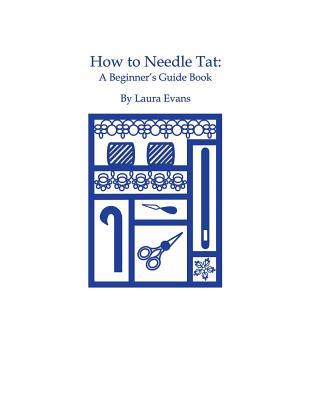A beginner can learn all of the needle tatting basics from this book. How to Needle Tat is designed for the complete novice. For people who have never held a needle, it begins with how to thread a needle.
Historically, tatting was considered the poor man's lace. It requires very few purchases: tatting needle, thread, needle threader, and a crochet hook.
This illustrated book gives you step-by-step instructions to make the double stitch--the primary stitch used in tatting. Actually, the double stitch is a Lark's head knot. Since it is a knot, your work will not unravel.
In addition, there is an entire section on how to read a tatting pattern. Every step of the Little Lace Flower pattern is fully written down. Then the same pattern is translated into three forms: abbreviated, numeric, and a diagram.
There is a reference section which includes the most common techniques and definitions. You can learn to add new thread to an incomplete project, to make a Josephine Knot, and many other techniques.
Finally, you can learn to make a pinning board. This board is used when finishing your lace. Also, several alternative methods are described in the chapter "Finishing Tatted Lace."
When finished, the Little Lace Flower can adorn a greeting card, be used as a holiday tree ornament, or appliqud to a quilt, clothes, or any other fabric.

A beginner can learn all of the needle tatting basics from this book. How to Needle Tat is designed for the complete novice. For people who have never held a needle, it begins with how to thread a needle.
Historically, tatting was considered the poor man's lace. It requires very few purchases: tatting needle, thread, needle threader, and a crochet hook.
This illustrated book gives you step-by-step instructions to make the double stitch--the primary stitch used in tatting. Actually, the double stitch is a Lark's head knot. Since it is a knot, your work will not unravel.
In addition, there is an entire section on how to read a tatting pattern. Every step of the Little Lace Flower pattern is fully written down. Then the same pattern is translated into three forms: abbreviated, numeric, and a diagram.
There is a reference section which includes the most common techniques and definitions. You can learn to add new thread to an incomplete project, to make a Josephine Knot, and many other techniques.
Finally, you can learn to make a pinning board. This board is used when finishing your lace. Also, several alternative methods are described in the chapter "Finishing Tatted Lace."
When finished, the Little Lace Flower can adorn a greeting card, be used as a holiday tree ornament, or appliqud to a quilt, clothes, or any other fabric.